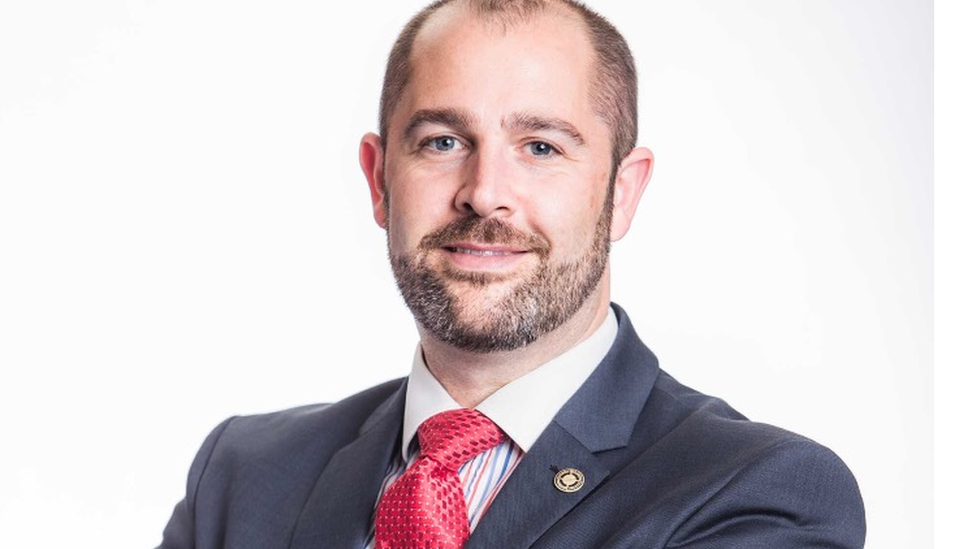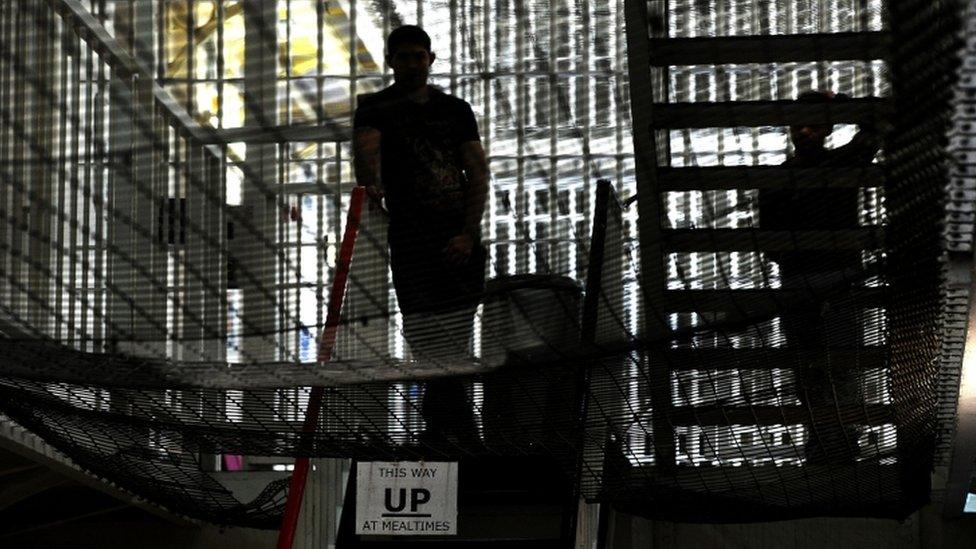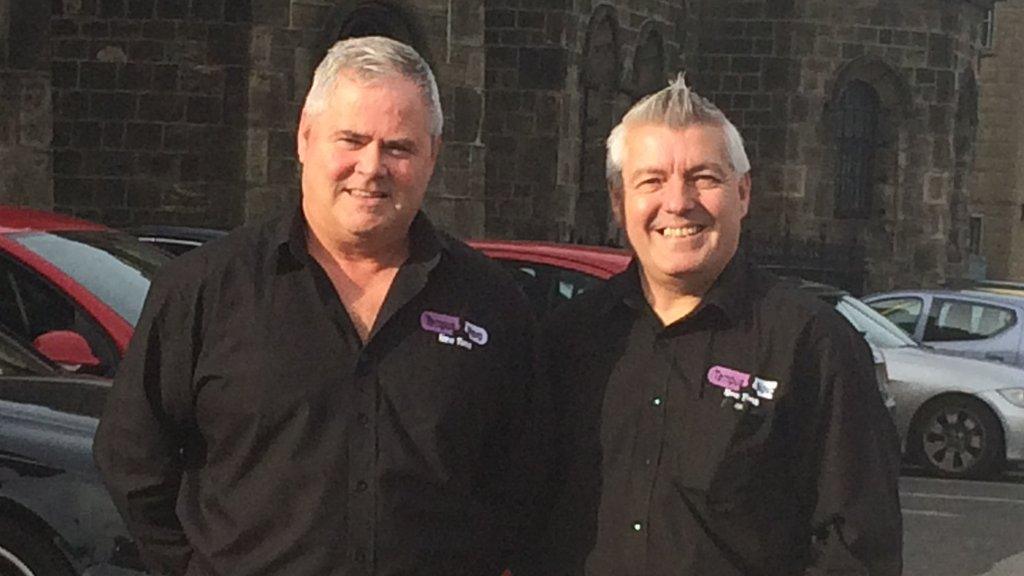Why companies give employment to ex-offenders
- Published

The Prince's Trust says work can make a difference to those who think life has written them off
Virgin Trains plans to recruit staff from prisons. But why would someone want to employ an ex-offender?
At an upmarket central London hotel MPs and judges wash down fine food with even finer wine, blissfully unaware that their gourmet meals may have been served and prepared by people who have had a brush with the law.
Some might think it odd that people who have been behind bars could be waiting on the nation's elite, but Simon Drake wouldn't have it any other way.
As manager of the Conrad London St James, he believes that giving a chance to young people who have fallen on hard times can trigger a hunger to succeed far beyond that of other employees.
"They want it more than just any other Joe Bloggs," he said. "They've seen the harshest side of life and they don't want to go back there again."

Companies can gain from employing ex-prisoners, hotel boss Simon Drake believes
For seven years Mr Drake has run recruitment and interview skills workshop days with the Prince's Trust.
Of the 150 staff at his five-star hotel, several were recruited through courses run by the youth education and training charity.
"Every single one of them has had problems with the law in the past," he said.
Many employers might balk at taking on an ex-offender, wary that someone with a record might not be right for their organisation.
But Mr Drake believes there can be mutual benefits from wiping the slate clean - and that a little compassion can encourage people to grab opportunities with both hands.

Just one-in-three offenders are in a job a year after their offence, government figures show
"These kids come out thinking, 'I'm never going to make a success of myself'," he said. "They have a slight option, a tiny light at the end of the tunnel that we give them, and they either throw their all into it or they don't.
"Once you've been in prison it's very rare that people want to go again, so most of these kids come to us and really want to make a difference.
"That's what I want - I want people that are passionate and are going to learn. Every now and again you get one that doesn't, but the majority want it more than anybody else."
Paul Brown, from the Prince's Trust, says employers can make a huge difference to those who believe life has written them off.
He said: "What we say to them is that it's important that young people face up to their past mistakes, but those mistakes needn't necessarily define a young person or their future potential.
"Many of them come out with a desperately low level of confidence and motivation, some of them don't believe anybody will give them a second chance.
"That's where we think we can make a difference, to boost their confidence and their soft skills to help them towards employment."
West Coast Mainline operator Virgin Trains ran a recruitment fair at Addiewell Prison in West Lothian this week and plans more such events across the UK every three months.
The company has been actively recruiting ex-offenders since 2013 and says it wants to help end the "revolving door syndrome" of reoffending.
Recruitment leader Kathryn Wildman said: "This isn't just about helping society and giving people a chance to turn their lives around. It's hiring the best people no matter what their background is.
"We'd urge other employers who might be thinking about this to give it a go."

Hard times
In the year to the start of April, 74,677 people were released from prisons in England and Wales.
Around one-in-three offenders are in a job a year after their offence.
Some 39% of offenders aged 18 to 62 were claiming out-of-work benefits two years after being convicted, cautioned or released from prison in 2010/11.
There are around 150 prison work coaches in resettlement prisons across Britain, helping offenders find work, facilitating training and providing work experience.
Source: Ministry of Justice, Department for Work and Pensions.

The desire of business people to help ex-offenders is welcome news to the government.
Just one in three offenders are in work a year after their offence, the Department of Work and Pensions said, and ministers believe getting prisoners into jobs is key to reducing offending, bringing forward plans to boost offender employment to early in the new year.
It has also secured help from more than 100 major companies, including the likes of Marks & Spencer, National Grid and law firm Eversheds for See Potential, external, a campaign encouraging employers to recruit from disadvantaged groups such as ex-offenders.
Make the most of it
While too many people still fall through the cracks and struggle to find work after prison, there are successes.
LJ Flanders had to find a job after finishing 14 months at Pentonville Prison in 2012.
The 27-year-old said: "The worry of not being able to get a job when I got out of prison was actually more of a stress than being in prison itself."
That fear spurred him into getting qualifications - while in prison he trained as a gym instructor and personal trainer.
Two weeks after he came out he approached Virgin Active for work.

Ex-prisoner LJ Flanders trained while behind bars for his life on the outside
In a "daunting" meeting with the manager he gingerly revealed his conviction - but was met with open arms.
Mr Flanders said: "He was really accommodating. I can remember what he said to me word for word - 'Who am I not to give someone a second chance?'.
"I was a bit worried going up there but I thought I've got to tell this person I have been in prison. I think if he'd seen it on paper I may have been overlooked.
"He gave me a big pat on the back and said, 'Make the most of it'."
After two happy years there Mr Flanders has now set up his own business, written a book, the Cell Workout, and works with the reform team at Wandsworth Prison delivering fitness sessions and personal development.
Ex-prisoners looking for work should be resilient, not get despondent and be honest with employers, he believes.
He said: "It is that much harder being labelled as an ex-offender, but it's important to not give up."
- Published3 November 2016
